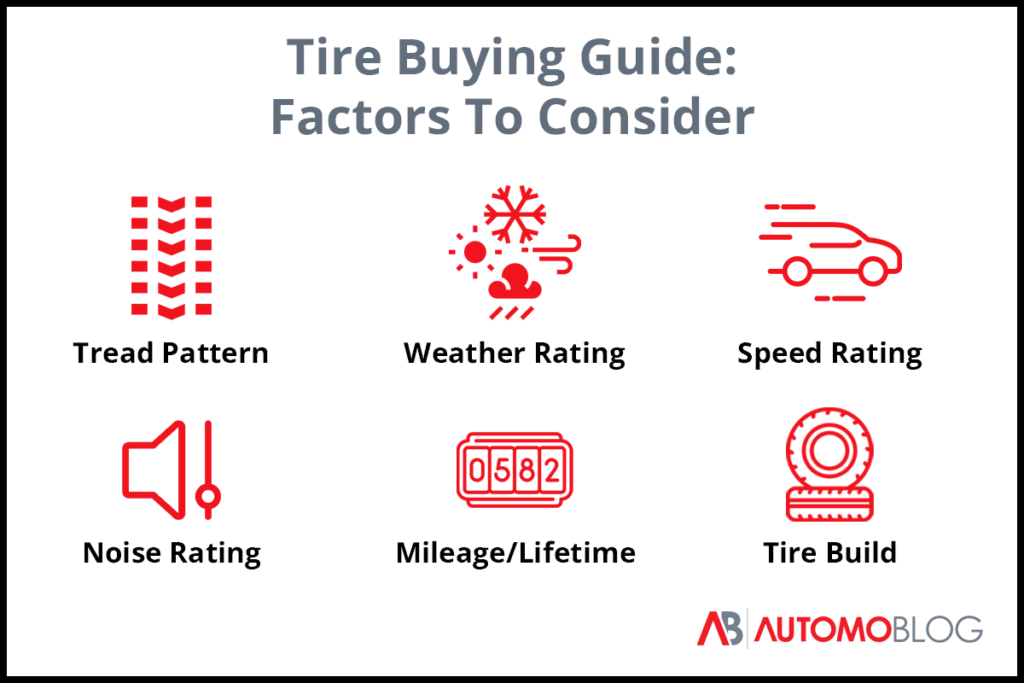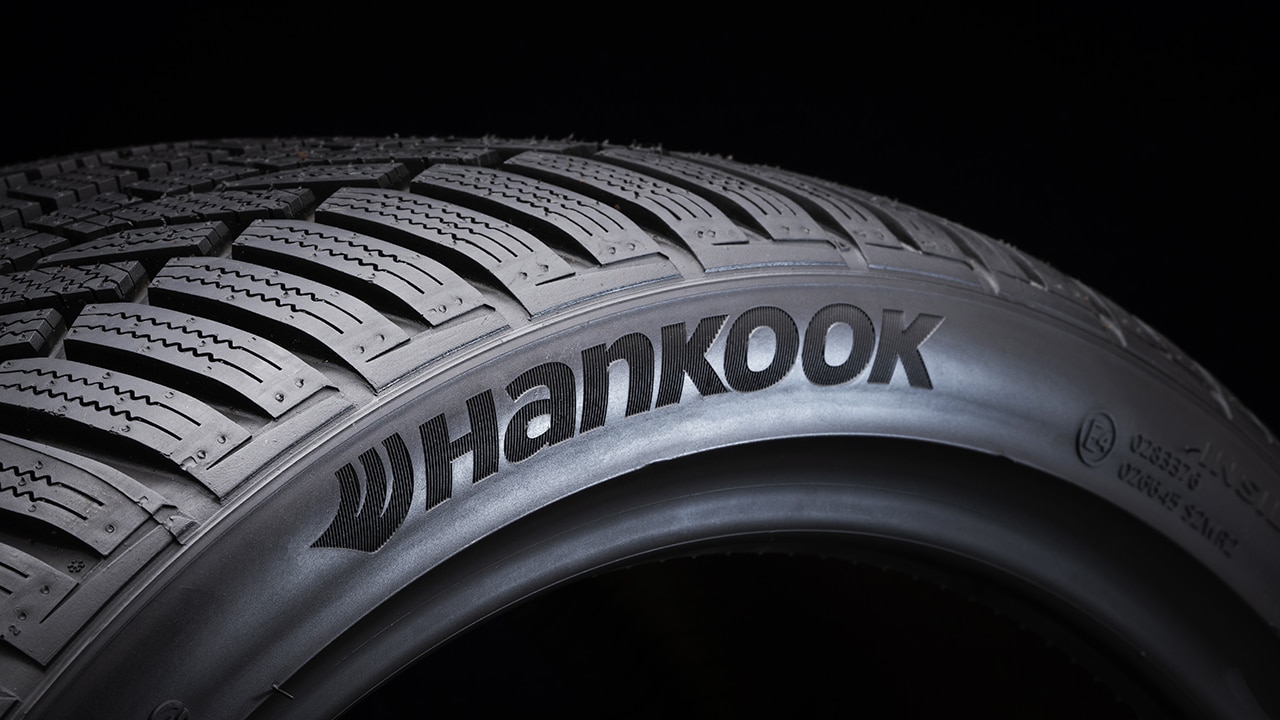Affiliate Disclosure: Automoblog and its partners may earn a commission when you use the services or tools provided on site. These commissions come to us at no additional cost to you. See our Privacy Policy to learn more.
- Hankook tires tend to be more affordable than many competitors but are comparable in terms of quality in many cases.
- The manufacturer is somewhat lacking in specialty tire options.
- Many Hankook tires come with 60,000-plus mile warranties

Hankook tires are an affordable alternative to other big-name brands. But does the lower cost mean lower quality?
In this review, we’ll discuss Hankook tires in depth, including industry reputation, popular models, costs, and more. We’ll also take a look at other top-rated tire manufacturers in case Hankook doesn’t offer the right tires for you.
After thoroughly researching the tire industry, we recently rated the best tires and brands on the market. Check out our review to find your next set of tires, or start comparing prices from a variety of brands, including Hankook, at DiscountTire.com.
About Hankook
Founded in 1941, Hankook is a relatively new tire brand in the industry. The company is based in Seoul, South Korea, but has a North American headquarters in Nashville, Tennessee. According to the 2019 Tire Business Global Tire Company Rankings, Hankook is the sixth-largest tire manufacturer in the world.
The company mostly produces passenger car, SUV, crossover, and light truck tires, but it also manufactures car batteries and motorsports equipment. Currently, Hankook supplies original equipment (OE) tires to both commuter and luxury brands including Toyota, Hyundai, Honda, and Porsche. The company also has several replacement tire models available.
Hankook is known for its affordable pricing, technological advancements, and popular passenger tire models. Hankook tires are priced similarly to Cooper tires, averaging below the $100 mark for many models.
Hankook Tires Cost
Hankook tires are more affordable than many big-name brands on the market, especially when you look at the company’s long-lasting tread life warranties. When considering the cost of a tire, you should account for both the sticker price and the tire’s longevity.
According to cost data from Discount Tire, Hankook tires cost an average of $123 to $223 per tire. Many of the company’s passenger tires are less than $100, which is much cheaper than what you’d find with Michelin, Goodyear, or even Continental tires. According to CostHelper, standard all-season tires average between $50 and $200, and Hankook tires are well within that range.
Hankook Tires Sample Prices
Here are what a few popular Hankook tires cost on Discount Tire:
- Hankook Kinergy ST H735: $61 to $117 per tire
- Hankook Dynapro AT2 RF11: $122 to $360 per tire
- Hankook Dynapro HP2 RA33: $122 to $190 per tire
- Hankook Ventus V2 Concept 2 H457: $65 to $111 per tire
As mentioned, several Hankook tires come with long tread life warranties, which make them cheaper in the long run.
Hankook Tires Industry Ratings
Industry experts laud Hankook’s rigorous testing standards – all tires are tested in multiple conditions in real time before being placed on the market. Like many top-rated brands, Hankook reports tire scores based on an evaluation system created by the National Highway Traffic Safety Administration (NHTSA). This system is called Uniform Tire Quality Grading (UTQG), and it grades tires – except specialized tires – based on their treadwear, traction, and temperature resistance.
Here’s an explanation of the UTQG grading system:
Treadwear
This grade estimates the longevity of your tires. To calculate treadwear, tires are measured against a control tire given a rating of 100. If a tire has a 500 treadwear rating, that means it lasted five times longer than the control. Most passenger tires have between a 300 and 500 treadwear rating, according to data from SaferCar.gov.
Traction
This grade measures how well your tires “grip” a wet road. Traction grades are given on a scale of AA, A, B, or C. Good day-to-day passenger tires typically receive an A rating.
Temperature
This grade evaluates a tire’s heat resistance on a scale of A, B, or C. Tires need to withstand different temperatures based on their specialization. High-performance tires, for example, usually move at much higher speeds than an all-season tire, and in turn, have higher temperature ratings.
It’s important to note that the NHTSA does not oversee UTQG tests. Manufacturers and independent companies hired by brands are responsible for tire testing and reporting.
Hankook UTQG Tire Ratings
Below, we detail a few highly rated Hankook tire models and their treadwear, traction, and temperature scores using data from SaferCar.gov.
| Hankook Tire Model | Tire Type | Treadwear Score | Traction Score | Temperature Resistance |
|---|---|---|---|---|
| Hankook Dynapro ATM RF10 | Light truck/SUV All-terrain |
560 | A | B |
| Hankook Kinergy PT H737 | Passenger Standard touring All-season |
700 | A | A |
| Hankook Optimo H724 | Passenger Standard touring All-season |
500 | A | B |
| Hankook Dynapro HT RH12 | Light truck/SUV Highway All-season |
380 to 700 | A to B | A to B |
If you want to know more about a Hankook tire you already own, you can check the tire’s sidewall for the UTQG grade.
Most Popular Hankook Tires
Hankook produces several high-quality passenger tire models, many of which boast a 60,000-mile or greater tread life warranty. As mentioned above, Hankook tires are a popular OE tire choice among commuter and luxury car brands alike. The manufacturer, however, offers limited truck and SUV models and few winter tires.
Below, we’ve listed the most popular Hankook tires based on industry reputation, customer satisfaction ratings, and our expert opinion.
- Hankook Dynapro ATM RF10: An all-terrain tire backed by a 50,000-mile tread life warranty and equipped with stone ejectors, a wraparound tread, and wave sipes
- Hankook Kinergy PT H737: An affordably priced all-season touring tire with an exceptional 90,000-mile tread life warranty
- Hankook Ventus V2 Concept 2 H457: Another affordable all-season performance tire with improved rolling resistance and a longer tread life warranty than many other performance models (45,000 miles)
Each of these tires holds at least a 4.0 out of 5.0-star rating, as well as a 90-percent or higher recommendation likelihood from customers on Discount Tire.
Hankook Tire Warranty
Hankook offers a six-year limited warranty for all its products. This protection covers any defective materials or workmanship from the original date of purchase. As for tread life warranties, most Hankook tires are within the 50,000-mile range, but some of its passenger models offer protection up to 90,000 miles.
Hankook Tires Buying Guide
Hankook tires are a generally affordable and often dependable option. However, not every tire is fit for every car, driver, location, or season. While a tire such as the Hankook Dynapro MT2 might be right for your neighbor, something like the Optimo H724 may be a better fit for you.
When shopping for new tires, you’ll want to understand the differences between tires and how to tell which tires are the right choice for you and your vehicle.
Hankook Tires: Factors To Consider

Tires have several qualities that make them better suited for certain cars and settings than others that you should be aware of, including:
- Tread pattern: Different tread patterns give tires distinct characteristics that change how they interact with the road. The most popular tread patterns are diagonal, asymmetrical, symmetrical, and combinations of these patterns.
- Tire build: Most tires are classified as either radial, bias-ply, or bias-belted. Radial tires tend to be more durable in general, but bias-built tires often have stiffer sidewalls and tend to cost less.
- Weather rating: Some tires are rated as all-weather tires and are suitable for most conditions. Others, such as Hankook winter tires, are built for specific seasons or weather conditions.
- Noise rating: Some tires are designed to be more quiet on the road. The difference between these and noisier ones from the perspective of people inside the car can be quite substantial.
- Tire life: Most manufacturers measure the expected lifetime of their tires in terms of miles.
- Speed rating: Tires come with a maximum safe speed from the manufacturer. Exceeding this speed could create a dangerous situation.
How To Read Hankook Tire Sizes
Hankook and other manufacturers use a standard method of listing tire sizes since there are several dimensions to consider. Using a common size of P 225/65R17, let’s break down what each element indicates:
- P: The first letter indicates the tire’s application. In this case, “P” stands for passenger, as this tire is meant for personal cars rather than, say, a trailer tire.
- 225: The first number in the sequence describes the tire width in millimeters. Our example tire, then, is 225 millimeters wide.
- 65: The number that follows the slash lists the height-to-width aspect ratio as a percentage. That means that this tire’s height is 65% of its width.
- R: The second letter indicates the type of tire build. In this case, “R” stands for radial. You may also see “B” for bias-ply or bias-belted tires.
- 17: The final number describes the diameter of the wheel rim it fits in inches. Our example tire fits a 17-inch rim.
Hankook Tire Reviews & Ratings
In the 2020 J.D. Power Original Equipment Tire Customer Satisfaction StudySM, Hankook ranked above average in the truck/utility segment and below average in the passenger tire segment. For truck and utility tires, Hankook scored 705 out of a possible 1,000 points, and for passenger tires, the company scored only 670 out of a possible 1,000 points.
The study considered the following criteria when ranking manufacturers:
- Tire ride
- Tire wear
- Tire appearance
- Tire traction and handling
Here’s what customers have to say about Hankook tires:
Positive Hankook Tires Reviews
“[The Dynapro HT RH12] handle [and] stick to the road nicely and are not very loud at highway speeds. The tread [wear] is surprisingly good… usually a tire that lasts this long is loud due to the harder rubber used in the tire, but not these. They’re quiet and still last a lot of miles. I’ve been very happy with now two sets of them.”
– Barry L. via Discount Tire
“This is the second set [of Ventus S1 Noble2 H452 tires] I’ve purchased. The first set lasted me five years. I kept up with regular tire rotations and have never had a single issue with them. They ride smooth and quiet. The handling is perfect… The way they grip the road and handle it makes me feel safe.”
– Mike R. via Discount Tire
Negative Hankook Tires Reviews
“[The Optimo H436] tires came with the purchase of my Hyundai Elantra four-door in 2013. Even though the tires are supposed to be [warranted] for 60,000 miles, the manufacturer would not back it up, saying Hyundai bought the tires without the warranty. [I] will never use Hankook tires again knowing how poorly [they] performed.”
– via Discount Tire
Hankook Tires: Conclusion
We rate Hankook tires 4.0 out of 5.0 stars based on the company’s industry reputation, customer satisfaction ratings, and tire variety. In general, the company produces good-quality tires at an affordable price. We like Hankook’s long-lasting tread life warranties, technological innovation, and high customer satisfaction scores.
However, the relative lack of specialty options means that people looking to take their cars off road or use them in high-performance settings may want to look elsewhere.
Hankook Tires: Recommended Competitors
If you’ve decided that Hankook tires are not the right fit for you, we recommend looking at some top-rated tire manufacturers. In our industry-wide best tires review, we named Michelin the Best Tires Overall and Cooper the Most Affordable. Both companies produce excellent tires and meet an array of consumer needs.
Michelin Tires: Best Tires Overall

Michelin is one of the biggest tire companies in the world. Established in 1889, Michelin has been at the forefront of innovation and quality for over a century. We like Michelin for its large product range. Rather than specializing in one tire model, the company produces high-quality tires across the board, including some of the best winter tires, summer tires, all-terrain tires, and more. The one downside to Michelin tires is their price point – high quality comes at a cost.
To find the right Michelin tire for you, visit DiscountTire.com.
Cooper Tires: Most Affordable

If Hankook’s affordable price is a selling point, you may want to consider Cooper tires. The manufacturer often offers cheaper products than Hankook, but with more selection. Cooper produces high-quality passenger models as well as a few of the best all-terrain tires around. However, Cooper does not produce OE tires.
To find the right Cooper tire for your vehicle, visit DiscountTire.com.
Hankook Tires: FAQ
Does Hankook make good tires?
Hankook makes good tires at affordable prices. While the company lacks some of the specialty options offered by other tire manufacturers, many of its tires are highly rated.
Are Hankook tires made by Michelin?
Hankook tires are not made by Michelin. The two companies are separate entities.
Are Hankook tires made in China?
Some Hankook tires are made in China. The company also manufactures its tires in Korea and Hungary.
Our Methodology
Our research team is committed to providing the most accurate, thorough, and unbiased information possible to help people make informed decisions about the tires they purchase. We use a standardized set of criteria to ensure the consistency and comparability of our reviews.
- Industry Reputation: To assess the overall reliability of each company, we looked at industry ratings from organizations like the Better Business Bureau (BBB) and more, along with the company’s longevity and other factors.
- Tire Variety: Our team considered the full range of each manufacturer’s tire lineup, giving higher scores to companies that offered larger and more diverse selections.
- Affordability: Costs are an important consideration when buying tires. We evaluated the price range of each company’s products to determine its affordability relative to competitors.
- Customer Satisfaction: Our researchers scoured the internet for reviews from customers to assess how satisfied people are with their brand experience. We considered review scores as well as looked for consistent patterns of complaints or praise.


